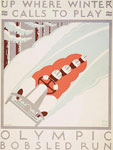The 2012 Summer Olympic Games begin on July 27 and continue through August 12. London hosts them this time, but in the past, the U.S. has hosted the Olympics eight times (four times in the summer and four in the winter), the most of any country! The U.S. also holds the greatest number of Olympic medals of any nation—more than 2,500.
What place have the Olympics had in U.S. history? The games can be many things: a focus for cultural exchange, a showcase for new technology and development, an economic boon (or bust), and a platform for international political tensions. Explore the history of the Olympics with these ideas:
- Read oral histories of Olympic participants from 1932 to 1968 and official Olympic reports from 1896 to 2010 at the Amateur Athletic Foundation Digital Archive. What were the experiences of American women who competed in the early Olympics like? How did being Korean American influence the experiences of diver Sammy Lee, who competed shortly after World War II? How do the Olympic reports from Los Angeles in 1932 and Salt Lake City in 2002 compare? Do the reports from Berlin, 1936, show any signs of the tension between the U.S. (and other nations) and Nazi Germany?
- Learn more about the 1936 Olympics and the significance of African American track-and-field star Jesse Owens's wins (and the wins of other African American athletes) in the U.S. Holocaust Memorial Museum's exhibit The Nazi Olympics: Berlin 1936. Here you can also learn about Jewish American athletes who competed in these Olympics.
- Watch PBS's documentary American Experience: Jesse Owens online, and follow the supporting links for more about Owens and the Olympics.
- Pick up quick facts on each of the past Olympic Games (and count down to future Olympics) at Olympic.org. What technological developments have changed how the Olympic Games are played, watched, and celebrated? You can also search for athletes, sports, and countries.
- Compare and contrast the Olympics with other international sporting events, like the Paralympics or the FIFA World Cup. Where have these taken place? How do different countries, including the U.S., relate to these events? When did they begin?
Whether you use the Olympics to explore cultural and technological change, international politics, local history (if you're lucky enough to live in one of the U.S. cities that hosted the Olympics!), or any of the many other rich angles possible, take advantage of this opportunity! Though school may not be in session for you right now, investigating Olympics history can lead to primary sources and historical connections you can weave into your curriculum.

